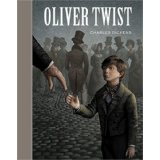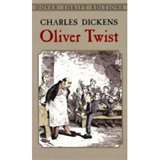 Charles Dickens was born on February 7, 1812, which makes this coming Tuesday his bicentennial. They’ve been making a big deal of it for some time in the U.K., no surprise (here’s the Bicentennial Website), but we like him over here, too. Charles Dickens was one of the most successful authors who ever lived, both in his own time and in the two centuries since, beloved in his own country and in English-speaking nations around the world. His popularity in America was such that readers could hardly wait for new installments of his serialized novels. Ships arriving from England in 1941, during the serialization of The Old Curiosity Shop, were greeted by dock workers with bullhorns, shouting, “Is little Nell dead?”
Charles Dickens was born on February 7, 1812, which makes this coming Tuesday his bicentennial. They’ve been making a big deal of it for some time in the U.K., no surprise (here’s the Bicentennial Website), but we like him over here, too. Charles Dickens was one of the most successful authors who ever lived, both in his own time and in the two centuries since, beloved in his own country and in English-speaking nations around the world. His popularity in America was such that readers could hardly wait for new installments of his serialized novels. Ships arriving from England in 1941, during the serialization of The Old Curiosity Shop, were greeted by dock workers with bullhorns, shouting, “Is little Nell dead?”
We experience something of that same phenomenon now with the newest title in a phenomenal series like The Hunger Games, but of course it’s hard to tell which authors today can anticipate a worldwide bicentennial celebration of their birth. Perhaps Dickens can give us a hint, though: what quality of his writing has proven to be so durable? And is it likely he’ll last another two hundred years? He had his detractors, even contemporary ones. Oscar Wilde in one of his trademark ironies, remarked that “One would have to have a heart of stone to read of the death of little Nell without laughing.” Sentimentalism is a frequent charge against him, and applied to some passages, it sticks. But there was a lot more to Dickens than poignant passing of dear little girls.
If I had to peg the secret of his success, I would say it’s similar to the same reason Shakespeare is still around, and that has to do with his characters. But there’s an important difference: Dickens created characters, while Shakespeare created character itself: a huge area of possibility that the actor, director, writer, and reader are free to explore. Dickens’ arena was his own mind, and his characters don’t leave a lot of room for interpretation. But they live: “not by [the author] describing them but by letting them describe themselves,” according to his friend and first biographer John Forster. Virginia Wolfe noted “characters who excel in detail, not accurately or exactly, but abundantly in a cluster of wild yet extraordinarily revealing remarks.”
G. K. Chesterton probably had the most fun with this aspect of the writer’s genius:
No man encouraged his characters
so much as Dickens. ‘I am an affectionate father,’ he says, ‘to every child of my fancy.’ He was not only an affectionate father, he was an over-indulgent father. The children of his fancy are spoilt children. They shake the house like heavy and shouting schoolboys; they smash the story to pieces like so much furniture. When we moderns write stories our characters are better controlled. But, alas! Our characters are rather easier to control. . . When we experience the ungovernable sense of life which goes along with the old Dickens sense of liberty, we experience the best of the [French] revolution. We are filled with the first of all democratic doctrines, that all men are interesting; Dickens tried to make some of his people appear dull people, but he could not keep them dull. He could not make a monotonous man.
There’s one very obvious reason for this vitality: Dickens characters are lively because he drew them from life.
 His own life was the stuff of fiction. Born into a respectable lower-middle-class family, his childhood was rather ungoverned and happy. But the foundations were shaky, and when Charles reached the age of twelve the bottom fell out. His father, a genial but careless sort, was imprisoned for debt in Marshalsea prison, along with most of his family. Charles was put to work in a rat-infested blacking (boot polish) factory. Though he only had to endure it for less than a year (a timely inheritance got his father out of prison and back on his feet) the shock and pain of this experience was so deep he couldn’t even talk about it until well into adulthood. And (heads up, amateur psychologists:) he always resented his mother for letting him languish in the factory for a few months after the family was released from prison. They probably needed his six shillings a week, but still.
His own life was the stuff of fiction. Born into a respectable lower-middle-class family, his childhood was rather ungoverned and happy. But the foundations were shaky, and when Charles reached the age of twelve the bottom fell out. His father, a genial but careless sort, was imprisoned for debt in Marshalsea prison, along with most of his family. Charles was put to work in a rat-infested blacking (boot polish) factory. Though he only had to endure it for less than a year (a timely inheritance got his father out of prison and back on his feet) the shock and pain of this experience was so deep he couldn’t even talk about it until well into adulthood. And (heads up, amateur psychologists:) he always resented his mother for letting him languish in the factory for a few months after the family was released from prison. They probably needed his six shillings a week, but still.
His education was spotty before, and sub-standard afterward, but young Charles had a quick mind and something close to a photographic memory. In addition to his native gifts, his months in the blacking factory gave him a desperate hunger for success and first-hand experience of life on the fringes. According to Chesterton, he was “sincerely, stubbornly, and bitterly ambitious”; at 15, he went to work as a junior clerk in a law office, during which time he taught himself shorthand and freelanced as a court reporter—the fastest scribbler in the system. From the court he went to the street, as a freelance reporter. Though in a way he never left the street, and his spare time often took the form of long walks through London, sometimes dusk to dawn.
His journalism led him to sketch work—short vignettes of life in the cities and provinces—which led in their turn to a serious of humorous stories published in monthly installments: The Posthumous Papers of the Pickwick Club. The Pickwick stories were an instant success, its author the talk of the town at age 24, and the rest is literary history. Dickens’s life from then on was a crush of deadlines, editing, speaking, touring, and packing enough work into the 33 years left to him for two writers at least. On June 8, 1870 he suffered a stroke after working all day on his last, unfinished novel, The Mystery of Edwin Drood, and never recovered consciousness. Even without Drood, of course, his legacy was secure. And at 200, he looks pretty good.
 We couldn’t let the bicentennial go by without some commemoration, so the weeks festivities will include a roundup of Dickens resources for kids; an answer to the question, “Why read Dickens?” with a close look at the first few chapters of my favorite Dickens novel; a review of the new best-selling middle-grade novel The Cheshire Cheese Cat: a Dickens of a Tale and interview with the author. AND, next Friday, we’ll give away a copy of The Cheshire Cheese Cat to the lucky winner of our trivia contest!
We couldn’t let the bicentennial go by without some commemoration, so the weeks festivities will include a roundup of Dickens resources for kids; an answer to the question, “Why read Dickens?” with a close look at the first few chapters of my favorite Dickens novel; a review of the new best-selling middle-grade novel The Cheshire Cheese Cat: a Dickens of a Tale and interview with the author. AND, next Friday, we’ll give away a copy of The Cheshire Cheese Cat to the lucky winner of our trivia contest!
The contest is for kids, though adults can help. To enter, first find answers to the questions below (and they’re not all on Wikipedia!). Email your answers to jbc@redeemedreader.com and we will either pick the entry with the most right answers or randomly pick from all the 100% correct entries. So how’s your Dickens knowledge? Here we go:
- Did the phrase “What the Dickens!” originate with Dickens?
- What pen name did he use for his earliest publications?
- How many children did he and his wife have?
- What two Dickens novels has Oprah recommended for her book club?
- What was the title of his first published story?
- What Dickens illustrator was nicknamed Phiz?
- What Dickens novel begins with this sentence: “Whether I shall turn out to be the hero of my own life, or whether that station will be held by anybody else, these pages must show.”
- In what newspaper was The Old Curiosity Shop serialized?
- In what Dickens novel does a character die from Spontaneous Human Combustion (SHC)?
- What Dickens novel was featured in the second-season finale of the TV series Lost?
You’ve got one week–on Friday we announce the winner!
Do you have a favorite Dickens novel? Tell us about it! And peruse our comments on A Christmas Carol, from the season not long past . . .
Stay Up to Date!
Get the information you need to make wise choices about books for your children and teens.
Our weekly newsletter includes our latest reviews, related links from around the web, a featured book list, book trivia, and more. We never sell your information. You may unsubscribe at any time.
Support our writers and help keep Redeemed Reader ad-free by joining the Redeemed Reader Fellowship.
Stay Up to Date!
Get the information you need to make wise choices about books for your children and teens.
Our weekly newsletter includes our latest reviews, related links from around the web, a featured book list, book trivia, and more. We never sell your information. You may unsubscribe at any time.
We'd love to hear from you!
Our comments are now limited to our members (both Silver and Golden Key). Members, you just need to log in with your normal log-in credentials!
Not a member yet? You can join the Silver Key ($2.99/month) for a free 2-week trial. Cancel at any time. Find out more about membership here.
8 Comments
Leave a Comment
You must be logged in to post a comment.


I love David Copperfield, and I wish I had time to re-read it—or maybe even read it to my kids. It’s so long that it’s a hard sell to get anyone to read it who’s not already a Dickensian.
I love David Copperfield, and I wish I had time to re-read it—or maybe even read it to my kids. It’s so long that it’s a hard sell to get anyone to read it who’s not already a Dickensian.
Same here with David Copperfield–wish I had time to read it again, that is. All the more reason for kids to dive in: they have more time!
Same here with David Copperfield–wish I had time to read it again, that is. All the more reason for kids to dive in: they have more time!
I read some Dickens as a girl, but I really became a fan when, as a very tired new mother, I read Pickwick Papers. I laughed til I cried! I agree the characters make the work, although many of his books have great plot lines.
You may want to change the date in the first paragraph, since it has you predicting that a new Dickens will be born this week in 2012! Thanks for the post.
Ouch! Good catch, Kristina. I’ll get on that. And you’re right about the humor–for all his cares and worries, Dickens was downright funny. We’ll talk about that a little later this week.
I read some Dickens as a girl, but I really became a fan when, as a very tired new mother, I read Pickwick Papers. I laughed til I cried! I agree the characters make the work, although many of his books have great plot lines.
You may want to change the date in the first paragraph, since it has you predicting that a new Dickens will be born this week in 2012! Thanks for the post.
Ouch! Good catch, Kristina. I’ll get on that. And you’re right about the humor–for all his cares and worries, Dickens was downright funny. We’ll talk about that a little later this week.